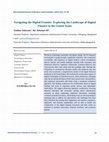Papers by Tanbina Tabassum

Deleted Journal, May 23, 2024
Driven by technology innovation and digital change, the US financial environment is going through... more Driven by technology innovation and digital change, the US financial environment is going through a significant transition. The exceptional accessibility and simplicity of digital finance-which encompasses fintech, bitcoin, and mobile banking-benefits both consumers and businesses. However, regulatory frameworks, consumer behavior, and cybersecurity risks come along with this paradigm shift. Through the integration of contemporary literature studies and empirical data, this study aims to present a comprehensive picture of the digital financial landscape in the United States. We evaluate the revolutionary impact of digital technologies on financial services, client preferences, emerging risks like decentralized finance (DeFi) and cybersecurity vulnerabilities, and regulatory innovations and limits using a systematic evaluation approach. Our findings underscore the multifaceted nature of digital banking and point to important trends, drivers, and stakeholder implications. We suggest enhancing regulatory coordination, fostering financial education and awareness, putting robust cybersecurity measures in place, supporting regulatory innovation, fortifying consumer protection measures, and keeping an eye on and responding to emerging risks to address the opportunities and challenges that have been identified. By putting these suggestions into practice, regulators, legislators, and business stakeholders will be able to handle the complexities of the digital banking ecosystem and fully utilize its potential to promote innovation, financial inclusion, and economic growth.

E+M Ekonomie a Management, 2021
Corporate governance has been widely debated for over a decade with the collapse of the financial... more Corporate governance has been widely debated for over a decade with the collapse of the financial and capital market under the prejudicial roles of regulatory bodies. Therefore, the study examined the impact of corporate governance on firm value in Bangladesh. A total of 63 DSE-listed companies from 2005 to 2019 consisting of 8,505 observations on an average of 15 years were chosen. The subsequent tests for the given data were conducted to identify the appropriate panel data analysis method for adjusted diagnostic problems. In the specific panel data, the Panel Corrected Standard Error (PCSE) was utilised following the application of the random effects method to control econometric limitations. It was revealed that corporate governance lowered firm value when the board structure was familially and politically affiliated and led by CEO-duality. Moreover, the inclusion of dynamic professionals and independent members in the board structure increased the firm value. The use of the corp...










Uploads
Papers by Tanbina Tabassum